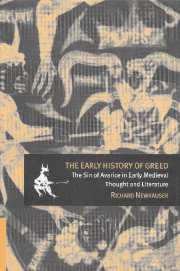Book contents
- Frontmatter
- Contents
- List of abbreviations
- Preface
- 1 Alms and ascetes, round stones and masons: avarice in the early church
- 2 Ascetic transformations I: monks and the laity in eastern Christendom
- 3 Ascetic transformations II: soaring eagles or safety in the herd – from anchoritic to cenobitic monasticism
- 4 Ascetic transformations III: the Latin West in the fourth and fifth centuries
- 5 Secularizing avarice and cupidity
- Epilogue: Future perspectives
- Appendix
- Notes
- Bibliography
- General index
- Index of names
- CAMBRIDGE STUDIES IN MEDIEVAL LITERATURE
4 - Ascetic transformations III: the Latin West in the fourth and fifth centuries
Published online by Cambridge University Press: 22 September 2009
- Frontmatter
- Contents
- List of abbreviations
- Preface
- 1 Alms and ascetes, round stones and masons: avarice in the early church
- 2 Ascetic transformations I: monks and the laity in eastern Christendom
- 3 Ascetic transformations II: soaring eagles or safety in the herd – from anchoritic to cenobitic monasticism
- 4 Ascetic transformations III: the Latin West in the fourth and fifth centuries
- 5 Secularizing avarice and cupidity
- Epilogue: Future perspectives
- Appendix
- Notes
- Bibliography
- General index
- Index of names
- CAMBRIDGE STUDIES IN MEDIEVAL LITERATURE
Summary
ASCETICISM AS ATTITUDE IN THE THOUGHT OF AMBROSE OF MILAN
The process of ascetic transformation which Cassian engaged in was also carried on by others in the West, though in a much different form and with different intentions. Here, too, ascesis remains the touchstone against which definitions of avarice can be measured, but outside the cenobium in the fourth and fifth centuries one finds more differentiated responses to the problem of greed, ranging from the secularization of ascetic ideas to their artistic analysis and to the “spiritualization” of the concept of avarice. The process involved here can be seen particularly well in the works of Ambrose, Bishop of Milan, whose familiarity with Basil's homilies dealing with avarice and the rich shaped much of his own concept of the vice. In Ambrose's hands the monastic rigor with which Basil attacked philargyria becomes altered fully in the service of the lay church and its clergy. As Basil before him, Ambrose can be quite detailed in specifying what the clergy is to do to rid itself of avarice; with the laity he is a good deal less demanding. But Ambrose also allowed his clergy the possession of property and was content to describe to them how to put it to best use. The fuga saeculi he had in mind was a moral one, not a physical withdrawal from the world.
- Type
- Chapter
- Information
- The Early History of GreedThe Sin of Avarice in Early Medieval Thought and Literature, pp. 70 - 95Publisher: Cambridge University PressPrint publication year: 2000



